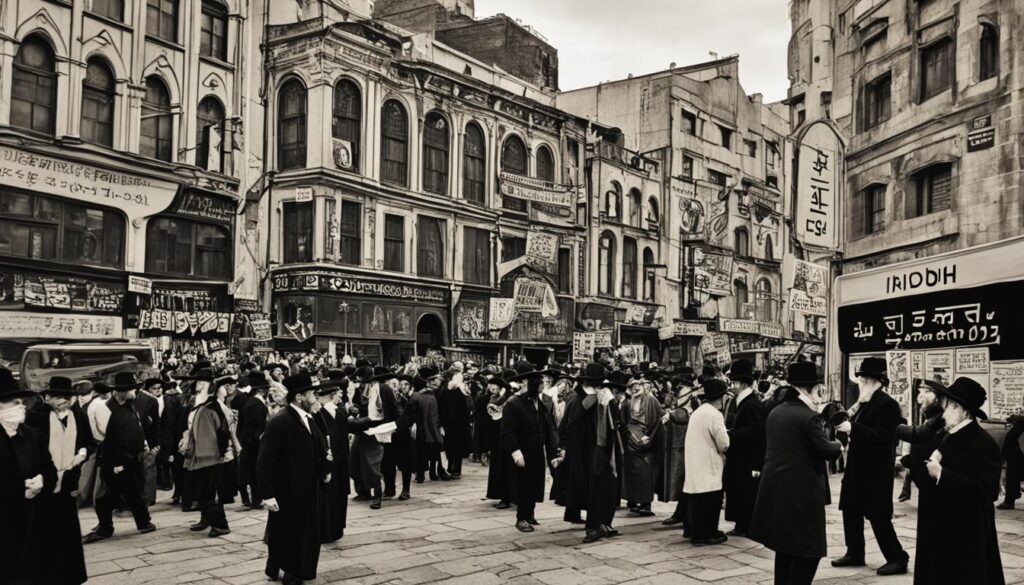If you’re looking for a captivating audiobook with a unique twist, look no further than Michael Chabon’s “The Yiddish Policemen’s Union.” This alternate history novel offers a fresh take on the detective genre, taking place in an alternate version of Alaska where Jewish refugees settled instead of Israel. In this audiobook review, we’ll dive into the world of “The Yiddish Policemen’s Union,” exploring its author, plot, narration, themes, characters, setting, and more. Whether you’re a seasoned audiobook listener or new to the format, this review will provide valuable insights and recommendations. So sit back, relax, and let’s explore the world of “The Yiddish Policemen’s Union.”
About the Author, Michael Chabon
Michael Chabon is a celebrated American author with a prolific background in writing. He was born in Washington DC in 1963 and later attended the University of Pittsburgh, where he received his MFA.
Chabon’s writing style is unique and captivating, often exploring complex themes and character relationships with humor and depth. He has a particular talent for weaving together historical events with elements of the fantastical and imaginative.
Chabon has written numerous critically acclaimed novels, such as “The Amazing Adventures of Kavalier & Clay”, which won the Pulitzer Prize for Fiction in 2001, and “Wonder Boys”, which was adapted into a successful film. His work has been praised for its vivid descriptions, authentic characterizations, and innovative approach to storytelling.
| Notable Works | Awards and Honors |
|---|---|
| “The Yiddish Policemen’s Union” | Edgar Award for Best Novel, Nebula Award for Best Novel |
| “The Amazing Adventures of Kavalier & Clay” | Pulitzer Prize for Fiction, PEN/Faulkner Award for Fiction |
| “Wonder Boys” | James Fenimore Cooper Prize for Best Historical Fiction, National Book Critics Circle Award Finalist |
Chabon’s impressive resume has made him a distinguished figure in the literary community. His ability to create memorable characters, transport readers to unique settings, and craft engaging narratives has earned him a wide fanbase and critical acclaim.
Plot Summary of “The Yiddish Policemen’s Union”
In “The Yiddish Policemen’s Union,” Michael Chabon created an alternate history where Jewish refugees settled in Alaska instead of Israel, as originally planned. The story is set in Sitka, a city on the coast of Alaska, and follows the life of Detective Meyer Landsman.
After finding the body of a drug-addicted chess prodigy in the hotel he lives in, Landsman becomes entangled in a murder investigation that leads him to discover a conspiracy involving the Orthodox Jewish community and the mysterious Messiah of Sitka. Together with his half-Tlingit partner Berko Shemets, Landsman navigates the complicated politics of the Jewish community and uncovers dark secrets.
While investigating, Landsman faces challenges, including the loss of his ex-wife Bina Gelbfish, who is now involved with his superior officer. As he delves deeper into the case, he uncovers the political machinations that could change the future of the Jewish population in Alaska and the world.
Throughout “The Yiddish Policemen’s Union,” Chabon weaves together complex themes of identity, loss, and the search for meaning. The alternate history setting adds depth to the story and challenges readers to imagine a different world.
The plot of “The Yiddish Policemen’s Union” is filled with twists and turns, as it explores both the mysteries and intricacies of the Jewish community. Chabon’s masterful storytelling style keeps readers engaged from start to finish, making it a must-read for fans of alternate history and mystery novels.
Audiobook Narration and Performance
One of the most important aspects of an audiobook is the narration and performance of the voice actor. In “The Yiddish Policemen’s Union,” the narrator does an excellent job of bringing the story to life through their style and voice acting.
The narrator’s tone and pacing are consistent, conveying the appropriate emotions and attitudes of the characters at each moment. They also aptly handle the Yiddish language throughout the audiobook, making it accessible for listeners who may not be familiar with it.
The ability of the narrator to differentiate between the various characters in the book is particularly noteworthy. Each character’s voice is unique, allowing the listener to easily distinguish between them without confusion.
Overall, the audiobook narration and performance in “The Yiddish Policemen’s Union” is top-notch and enhances the listening experience.
Themes and Symbolism in “The Yiddish Policemen’s Union”
“The Yiddish Policemen’s Union” features a rich tapestry of themes and symbolism, providing a thought-provoking commentary on the alternate history world created by Michael Chabon. At its core, the novel grapples with issues of identity, loyalty, and the search for a sense of belonging. The themes of displacement, exile, and the immigrant experience are central to the story, reflecting the historical struggles of Jewish people in the real world. Through its characters and plot, the audiobook also explores the corruption and political intrigue that pervade the alternate history setting of Sitka, an Alaskan city established as a temporary safe haven for displaced Jews.
The use of symbolism throughout the novel further enhances its depth and meaning. The use of traditional Yiddish words and cultural customs adds authenticity to the setting and characters while highlighting the cultural impact of the Jewish people in the alternative United States. The chess motif and references to the ten sefirot in Kabbalah provide a deeper understanding of the novel’s themes of power, control, and interconnectedness. Chabon masterfully uses symbolism to create a layered story that offers something new with each reading or listening.
The Symbolism of Chess
| Symbol | Meaning |
|---|---|
| The Chessboard | Represents the world in which the characters move and operate. It highlights the interconnectedness and complexity of their relationships and goals. |
| The King | Symbolizes power, hierarchy, and control. The struggle for the king’s position is a metaphor for the complex political climate in the alternate United States. |
| The Pawn | Represents the common people who are often ignored or exploited by those in power. The pawns can also be transformed into more powerful pieces, reflecting the potential for change and growth. |
The use of chess symbolism also underscores the audiobook’s exploration of order versus chaos and the human desire for control. The characters’ lives and choices are viewed through the lens of the game, creating a sense of tension and anticipation that keeps listeners engaged.
Ultimately, the themes and symbolism present in “The Yiddish Policemen’s Union” offer a multi-faceted reading or listening experience that will appeal to fans of alternate history, complex characters, and thought-provoking themes.
Character Analysis in “The Yiddish Policemen’s Union”
Michael Chabon expertly crafts a cast of complex characters in “The Yiddish Policemen’s Union,” adding depth to the alternate history setting. Detective Meyer Landsman is the protagonist, and his flawed persona provides a unique perspective on the story. His relationship with his half-Jewish partner, Berko Shemets, is explored, highlighting the tensions and possible consequences of their partnership.
The character development in “The Yiddish Policemen’s Union” is subtle yet powerful. Readers will witness the slow evolution of Landsman as his past, present, and future intertwine. The supporting characters, such as Landsman’s ex-wife and his boss, also contribute significantly to the overall plot trajectory.
Their motivations and relationships are carefully crafted to showcase the intricacies of the alternate history world. The use of Yiddish phrases and Jewish traditions adds another layer of authenticity to the characters, emphasizing the cultural context of their actions and decisions.
The alternate history backdrop of the novel and its unique characters make “The Yiddish Policemen’s Union” an intriguing read, full of twists, turns, and unexpected character developments.
Setting and World-building in “The Yiddish Policemen’s Union”

One of the standout aspects of “The Yiddish Policemen’s Union” is its richly detailed setting and world-building. Michael Chabon’s alternate history setting is a gripping backdrop that lends an air of mystery and intrigue to the audiobook.
The story takes place in Sitka, Alaska, which is a temporary homeland for Jews displaced after World War II. Chabon masterfully blends this historical basis with an imaginative twist, creating a distinct atmosphere that transports listeners to an entirely different world.
Atmosphere and Mood
The detailed descriptions and atmospheric writing add to the immersive experience, allowing listeners to picture the surroundings and feel the tension and emotions of the characters. From the cold, snowy streets of Sitka to the rundown apartment buildings, every location is vividly depicted and contributes to the overall mood of the story.
Alternate History
The alternate history setting presented in “The Yiddish Policemen’s Union” is a fascinating and unique concept, adding depth to the audiobook. Chabon’s imaginative portrayal of a Jewish homeland in Alaska offers a glimpse of what could have been and sparks thought-provoking discussions around what might happen if history had taken a different course.
Writing Style and Language in “The Yiddish Policemen’s Union”
Michael Chabon’s writing style in “The Yiddish Policemen’s Union” is notable for its descriptive and poetic language, which transports readers into the alternate history world he has created. Through vivid prose and narrative techniques such as using different voices and dream sequences, Chabon masterfully builds a fully realized world that is both familiar and strange.
One of the unique aspects of Chabon’s writing style in this audiobook is his frequent use of Yiddish phrases and references. This addition adds to the authenticity and richness of the story, making it feel like a true reflection of the Jewish culture and history it is based on.
Chabon’s use of language also adds depth to the characters and their relationships, allowing readers to truly understand the motivations and emotions behind their actions.
In summary, Chabon’s writing style and language in “The Yiddish Policemen’s Union” elevate the storytelling and add richness and authenticity to the alternate history world he has created.
Pacing and Structure of the Audiobook
When it comes to the audiobook version of “The Yiddish Policemen’s Union,” the pacing and structure are crucial elements to consider. The audiobook is a total of 12 hours and 38 minutes long, making it a significant time commitment for listeners. However, the pacing is well-suited to the story’s style and tone, with a steady buildup of tension and suspense throughout the narrative.
The audiobook’s chapter organization is straightforward and easy to follow, with each chapter titled according to its content. The clear delineation of the chapters allows for easy breaks and pick-ups, making it a great choice for those who like to listen in shorter intervals.
The overall structure of the audiobook aligns with that of the novel, with each chapter building upon the last to create a cohesive and engaging story. Listeners will appreciate the attention to detail in the audiobook’s production, with clear and consistent audio quality, and seamless transitions between chapters.
In summary, the pacing and structure of “The Yiddish Policemen’s Union” audiobook are well-executed, keeping listeners engaged throughout its 12-hour runtime. The clear chapter organization and overall structure make it a great choice for audiobook fans who appreciate a well-paced and structured narrative.
Reception and Awards for “The Yiddish Policemen’s Union”
Since its release, “The Yiddish Policemen’s Union” has received critical acclaim and awards, solidifying its place in the canon of alternate history novels.
The audiobook has an impressive 4.1-star rating on Goodreads and a 4.5-star rating on Audible. Michael Chabon’s work has also earned recognition from industry insiders and literary organizations. In 2008, “The Yiddish Policemen’s Union” won both the Hugo and Nebula Awards for Best Novel, two of the most prestigious awards in science fiction and fantasy literature.
| Award | Year | Category |
|---|---|---|
| Hugo Award | 2008 | Best Novel |
| Nebula Award | 2008 | Best Novel |
The critical reception for the novel was overwhelmingly positive, with reviewers praising Chabon’s writing, intricate world-building, and unique alternate history premise. Many noted the book’s ability to appeal to a wide range of audiences, from mystery fans to those interested in Jewish culture and history.
Comparisons to Other Works in the Genre
When it comes to alternate history novels, “The Yiddish Policemen’s Union” by Michael Chabon stands out for its unique blend of genres and cultural themes. While other works in the genre, such as Philip K. Dick’s “The Man in the High Castle” or Harry Turtledove’s “Southern Victory” series, focus on specific historical events or periods, “The Yiddish Policemen’s Union” imagines a whole new alternate reality, where Jewish refugees settle in Alaska and create their own society.
In terms of similarities, some readers may find echoes of Neil Gaiman’s “American Gods,” which also weaves together myth and history to create an imaginative world. Additionally, the noir detective style of “The Yiddish Policemen’s Union” may appeal to fans of Dashiell Hammett or Raymond Chandler.
However, what sets “The Yiddish Policemen’s Union” apart is its thoughtful exploration of identity, language, and culture. By placing Jewish characters at the center of this alternate history, Chabon not only creates a compelling mystery but also offers a nuanced commentary on the Jewish experience in America.
Overall, if you are a fan of alternate history novels that push the boundaries of genre and thought, “The Yiddish Policemen’s Union” is a must-read.
Impact and Legacy of “The Yiddish Policemen’s Union”
Since its release, “The Yiddish Policemen’s Union” by Michael Chabon has left a significant impact on the literary world. This alternate history audiobook has a lasting legacy that has influenced many authors and readers alike.
The cultural influence of this audiobook can be seen in its ability to bring Yiddish language and culture to a wider audience. Chabon’s use of Yiddish phrases and terminology in the story adds depth and authenticity, bringing to life a world that is unfamiliar to many listeners.
Furthermore, the themes and social commentary within the novel have contributed to its cultural impact. The audiobook’s exploration of Jewish identity, politics, and history have made it relevant and thought-provoking for many listeners, adding to its significance in contemporary literature.
Overall, the impact and legacy of “The Yiddish Policemen’s Union” can be seen in its ability to broaden cultural horizons and spark intellectual curiosity. Its relevance and uniqueness have made it a valuable addition to the alternate history genre and the broader literary world.
Recommended Audience for “The Yiddish Policemen’s Union”

If you are a fan of alternate history novels and enjoy complex characters and intricate plots, “The Yiddish Policemen’s Union” audiobook is the perfect choice for you. As this novel features various literary genres, it caters to a diverse audience that appreciates mystery, crime, and hardboiled detective fiction with a twist.
Book Genres
The audiobook successfully blends the elements of crime fiction, alternate history, and noir genres, which provide a unique reading experience to the listener.
Moreover, the historical context of the novel, rooted in the Jewish culture of the 1940s, adds an extra layer to the story, making it appealing to readers interested in historical fiction.
Alternate History Fans
For those who enjoy alternate history novels, “The Yiddish Policemen’s Union” offers an intriguing exploration of a world where Israel is no longer a state and the Jewish population resides in a temporary settlement in Alaska.
The author, Michael Chabon, does an excellent job of presenting a plausible alternate reality, which not only serves as an entertaining read but also prompts the listeners to reflect on the significance of historical events and the role they play in shaping the world we live in today.
In summary, “The Yiddish Policemen’s Union” audiobook recommended for fans of alternate history, crime, and noir fiction, as well as those with an interest in historical fiction.
Pros and Cons of “The Yiddish Policemen’s Union” as an Audiobook
Experiencing “The Yiddish Policemen’s Union” as an audiobook offers both advantages and disadvantages to readers.
| Advantages | Disadvantages |
|---|---|
| Multi-sensory Experience: The audiobook format adds an aural dimension to the story, creating a more immersive experience for listeners. | Lack of Visual Aids: Unlike a physical book, listeners cannot easily navigate back and forth between pages or refer to maps or other visual aids. |
| Convenience: Audiobooks allow for hands-free listening during commutes, household chores, or other activities. | Pacing: The pace of the audiobook may not be suited to every listener’s reading speed or preferences. |
| Narration: A skilled narrator can enhance the story’s elements of humor, suspense, and intrigue. | Cost: Audiobooks are often more expensive than physical or e-book versions. |
Ultimately, the decision to experience “The Yiddish Policemen’s Union” as an audiobook depends on individual preferences and circumstances. The unique advantages and disadvantages of this format should be considered before making a decision.
Critique and Final Thoughts on “The Yiddish Policemen’s Union”
After a thorough analysis of “The Yiddish Policemen’s Union” audiobook, I have formed my personal opinion on the strengths and weaknesses of the work.
Overall, Michael Chabon’s alternate history novel is a unique and captivating story that offers a fresh perspective on the genre. The plot is complex and unpredictable, keeping listeners engaged and intrigued throughout the audiobook. Furthermore, the author’s use of Yiddish language and cultural references adds depth and richness to the story.
The audiobook narration and performance by Peter Riegert is also noteworthy. Riegert delivers a masterful voice acting performance, skillfully bringing the characters to life and enhancing the storytelling experience.
However, “The Yiddish Policemen’s Union” does have some drawbacks. The pacing of the audiobook may be too slow for some listeners, and the use of Yiddish phrases, while adding to the authenticity of the story, may be difficult for non-Yiddish speakers to follow.
In my personal opinion, the strengths of “The Yiddish Policemen’s Union” outweigh the weaknesses, making it a worthwhile addition to any audiobook listener’s collection. The intricate plot, cultural significance, and masterful narration combine to create a truly unique and thought-provoking listening experience.
Conclusion
In summary, “The Yiddish Policemen’s Union” by Michael Chabon is a unique and thought-provoking alternate history novel. The audiobook version provides an immersive experience that brings the story to life. Michael Chabon’s writing style, use of Yiddish phrases, and detailed descriptions create a richly imagined world that is both familiar and foreign.
The performances of the audiobook narrator are exceptional, effectively capturing the diverse range of characters and their motivations. The pacing and structure of the audiobook keep the listener engaged throughout, making for a satisfying listening experience.
Overall, “The Yiddish Policemen’s Union” is a highly recommended audiobook for fans of alternate history novels and those interested in exploring social commentary through fiction. Its impact and legacy continue to be felt in the genre and beyond.
While there may be some minor drawbacks to experiencing this audiobook format over reading the physical book, the pros far outweigh the cons. For those who prefer to consume literature through audio, “The Yiddish Policemen’s Union” is an excellent choice.
Based on our thorough analysis and evaluation, we give a strong recommendation for “The Yiddish Policemen’s Union” as an audiobook that is both entertaining and thought-provoking.



